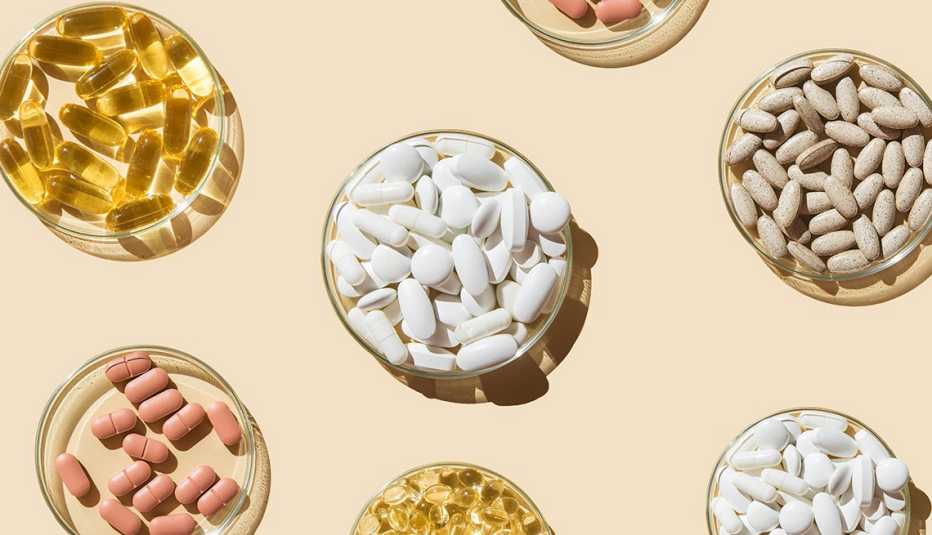AARP Hearing Center


A diagnosis of prediabetes — or finding out your blood sugar is elevated — can motivate anyone to consider all their options to prevent full-blown diabetes. For some, that’s meant turning to supplements in hopes of lowering blood glucose. But the evidence for this prevention strategy seems to be somewhat limited — and mixed.
“Certainly, when it comes to vitamins, minerals, supplements and herbs, we have a long history of trying to find something that is going to help. But the sad reality is that the research to date is not as clear-cut,” says Amy Hess-Fischl, registered dietitian and diabetes educator at the University of Chicago Medical Center. “One thing we have to acknowledge about any chronic condition — and certainly diabetes and prediabetes specifically — is that there isn’t really a magic bullet.”
Still, some research has been done to evaluate whether certain supplements could help lower blood sugar in people with prediabetes, whose blood sugar is elevated above a healthy, normal range, putting them at higher risk for diabetes.
If you are thinking of taking a supplement, Hess-Fischl advises talking with your doctor first to make sure that it doesn’t interact with other medications, such as those taken for high blood pressure or cholesterol.
Vitamin D
Perhaps one of the most promising cases being made for taking a supplement to prevent diabetes — for people with prediabetes — involves vitamin D, which doctors frequently recommend to patients to promote healthy bones.
The American Diabetes Association notes that studies have found a link between low vitamin D levels and an increased risk for insulin resistance. Sensitivity to insulin, a hormone secreted by the pancreas, is necessary for cells to absorb — and the body to properly manage — blood sugar and turn it into energy; and insulin resistance is a hallmark of diabetes.
To see if taking a vitamin D supplement would help, researchers analyzed participant data from three different clinical trials and found that adults with prediabetes lowered their risk of developing diabetes by 15 percent when they took a vitamin D supplement. During a three-year follow-up period, 22.7 percent of people with prediabetes who took vitamin D developed diabetes, compared with 25 percent of study participants who were given a placebo.
“The evidence is pretty consistent that vitamin D lowers risk of diabetes in people with prediabetes,” says Anastassios Pittas, M.D., who led the meta-analysis in the Annals of Internal Medicine first published online in February. But the effect, or percentage risk reduction, was lower than the researchers expected based on those previous studies, adds Pittas, chief of endocrinology, diabetes and metabolism at Tufts Medical Center in Boston, who receives funding from the National Institutes of Health to study vitamin D. Another way to put this, according to a summary of the results provided by Pittas and other researchers: “About 30 adults with prediabetes would need to be treated with vitamin D to prevent 1 person from developing diabetes.”
What wasn’t clear from the research is the dose people with prediabetes would need to take to get the optimal effect without taking too much of the supplement.
In the three trials from which Pittas’ team evaluated participant data, those enrolled were given 2,800 to 4,000 international units (or IUs, equivalent to 71 to 100 micrograms) of vitamin D per day. That’s at the upper limit of what’s considered safe, according to the NIH, and well above the average recommended daily amount for adults (which amounts to 600 IUs for people ages 19 to 70 and 800 IUs for adults 71 and older). Too much vitamin D can be harmful and cause issues ranging from nausea and vomiting to dehydration and kidney stones.
More research is needed, including on dosing, as well as to see how individual characteristics such as race and how long a person takes a vitamin D supplement contribute to the outcome, points out Zhenqi Liu, M.D., James M. Moss professor of diabetes at the University of Virginia School of Medicine.





































































More on Health
7 Types of Medication That Cause Bloating
Feeling puffy, swollen and bloated? Give yourself a gut check
7 Simple Ways to Lower Your Blood Sugar
How to bring your A1C back to a healthy range and avoid type 2 diabetes. Plus, could ice cream help?9 Nutrients You Need More of As You Get Older
Find out which vitamins, minerals and other essential elements you may lack in your diet